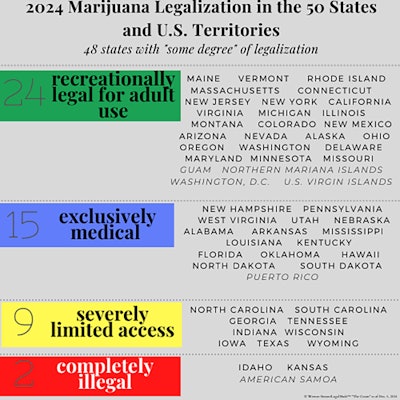The November 2024 election is behind us. Four states presented marijuana legalization propositions to their voters. Three states where marijuana is already medically legal, Florida, South Dakota, and North Dakota, had recreational legalization on the ballot.
All three states rejected adult use as follows:
Only Nebraska Changed Its Legalization Status, Becoming a Medical Marijuana State
The only victory for marijuana legalization in this past election cycle was in the Cornhusker State of Nebraska. This victory comes after nine years of state government officials failing to support marijuana legalization legislation, including failed efforts to legalize medical use in 2020, when a legalization ballot initiative was invalidated by the Nebraska Supreme Court.
Nebraska voters legalized medical marijuana and created a state commission to regulate the distribution and sale of medical marijuana. Almost 900,000 Nebraskans took to the polls in November 2024 and voted on two pro-medical marijuana initiatives. Roughly 71% of those voting (over 637,000 voters) said yes to medical marijuana legalization and 67.3% said yes to a regulated marketplace (Nebraska initiatives 437 & 438).
The voters’ actions resulted in the passage of the Nebraska Medical Cannabis Patient Protection Act, which permits patients with qualified medical conditions (to be decided by the commission) to possess up to 5 ounces of medical marijuana to treat those conditions. So far, a lower court in Nebraska has upheld the passage of the legislation in a lawsuit filed by an anti-legalization former state senator. This means the Nebraska Supreme Court could ultimately rule on whether to uphold the decision of the voters.
November 2024 Legalization Results Chart
 © Werner-Simon/Legal Buds ®
© Werner-Simon/Legal Buds ®
Post-Election Status of Marijuana Legalization in The U.S.
There are currently (post-Nov. 5, 2024) 24 states that have legalized both recreational and medical marijuana and 15 states that have legalized only medical usage.
 © Werner-Simon, Dec. 5, 2024
© Werner-Simon, Dec. 5, 2024
That is a whopping 39 states (once Nebraska’s is implemented – more on that later in this article) with some degree of medical use legalization.

Cannabis Remains Federally Illegal to This Day
But on the overarching federal aspect of legalization, marijuana remains absolutely illegal. This is why cannabis businesses cannot have federally insured bank accounts; why it remains illegal to purchase marijuana with federally insured banks’ credit cards or debit cards; why cannabis businesses cannot declare bankruptcy (a federal privilege); and why green card holders cannot “legally” work for or own a cannabis business, or else they risk deportation. Immigration law (that is who gets to remain in the country or who has to go) is also a federally controlled area.
Marijuana has been and remains a federally illegal Schedule I controlled substance. No physician practicing medicine in the United States, who has a DEA license to prescribe medication, can prescribe marijuana. If they do, they risk reprisals against their DEA licenses to prescribe narcotics. This is why in states that have legalized medical marijuana, those physicians issue “recommendations” for patients to use the substance. These physicians and the legal states make clear that medical marijuana can be used by a patient if the patient has a “recommendation” from a physician.
The illegal status of marijuana is a result of President Nixon’s antipathy to marijuana, and its classification as a Schedule I illegal drug was based, in large measure, on who the then-president perceived used the drug (think hippies and others who objected to Nixon/America’s involvement in Vietnam).
The federal position on marijuana is and remains that the substance has no accepted medical use. The current DEA.gov website marijuana fact sheet makes clear that: Marijuana is a Schedule I substance under the Controlled Substances Act, meaning that it has a high potential for abuse, no currently accepted medical use in treatment in the United States, and a lack of accepted safety for use under medical supervision.
But this 50-plus-year classification may be coming to an end.
Biden Administration’s Efforts to Reschedule
In May 2024, the Biden administration proposed that marijuana be reclassified from a Schedule I drug (that no physician can prescribe or else risk the loss of his or her DEA license) to a Schedule III controlled substance that the FDA would have the power to regulate as medicine (the same category as Tylenol with codeine and Ketamine), but it is still not a done deal.
This was after there were some 43,000 public comments on Attorney General Merrick Garland’s proposed rule change. But the federal government’s administrative law judge, John Mulrooney, who is overseeing the possible reclassification of marijuana, did not hear testimony at the Dec. 2 preliminary proceedings. He left testimonies for future proceedings that are scheduled to run from Jan. 21 to March 6, 2025.
The DEA representative at the Dec. 2 hearing appeared less than enthusiastic about the proposed rescheduling of marijuana. Instead of heartily stating that the DEA embraced or supported the reclassification proposal, the DEA’s lead counsel, Deputy Section Chief James J. Schwartz, informed the court that the agency was merely a “proponent” of the rule change. (This is a legal term for “placing the item before the court.”)
Change in Presidents Likely Means Change in Legalization Position
It was lost on few at the Dec. 2, 2024, hearing in Virginia that the DEA was likely hedging its bets because of the change in the presidential administrations coming at noon EST on Monday, Jan. 20, 2025. While the Biden administration proposed marijuana’s reclassification from a Schedule I substance to a drug that has currently accepted medical use (Schedule III), Donald Trump as the 45th president had two Senate-confirmed attorneys general (Jeff Sessions and Bill Barr) who were adamantly anti-marijuana.
Trump has flip-flopped on the issue, asserting in 2024 when Florida had the ultimately unsuccessful adult recreational initiative on the ballot, that he, a Florida resident, would be supporting it.
Trump’s picks for his upcoming presidential administration take a different anti-marijuana position. Pam Bondi, his pick for U.S. attorney general, who was Florida’s state attorney general, was against medical legalization when that initiative was being considered in Florida.
Similarly, Trump’s pick to head the Food and Drug Administration, Marty Makary, has referred to marijuana as a “gateway drug” and suggested that usage causes cognition issues. This does not bode well for the federal government maintaining President Biden’s Administration’s efforts to reschedule marijuana to stop America’s war on drugs.
Here’s the looming issue that appears to be lost in the hubbub but acknowledged by the judge.
Timing of Inauguration on Jan. 20, 2025, Is Key
The new administration (Trump as the 47th president) happens at noon EST on Jan. 20, 2025. With the administrative law judge hearing overseen by Mulrooney scheduled to go until at least March 6, 2025, the DEA (in its current configuration) will not be able to adopt the proposed rescheduling rule before the presidential transition. This means the Trump administration can revoke the proposed rule before Mulrooney issues a recommended decision.
As a matter of settled administrative law, if the federal agency has not yet published the final rule, the proposed rule can be withdrawn at any time before it has been published in the Federal Register.
Mulrooney, at the Dec. 2 hearing, mentioned that the DEA’s legal counsel indicated it might not be available to continue the proceeding until July 2025. The judge decided against such a lengthy continuance but the court also recognized that if the DEA (intimating that that would be the new administration’s DEA) wished to change its position on reclassification, it could do so.
This means that what happens federally remains an open question. Much depends on whether Trump’s administration allows a reclassification rule to be formally published. Time will tell.
Source link
#November #Election #Marijuana #LegalizationAcross #States #Feds

